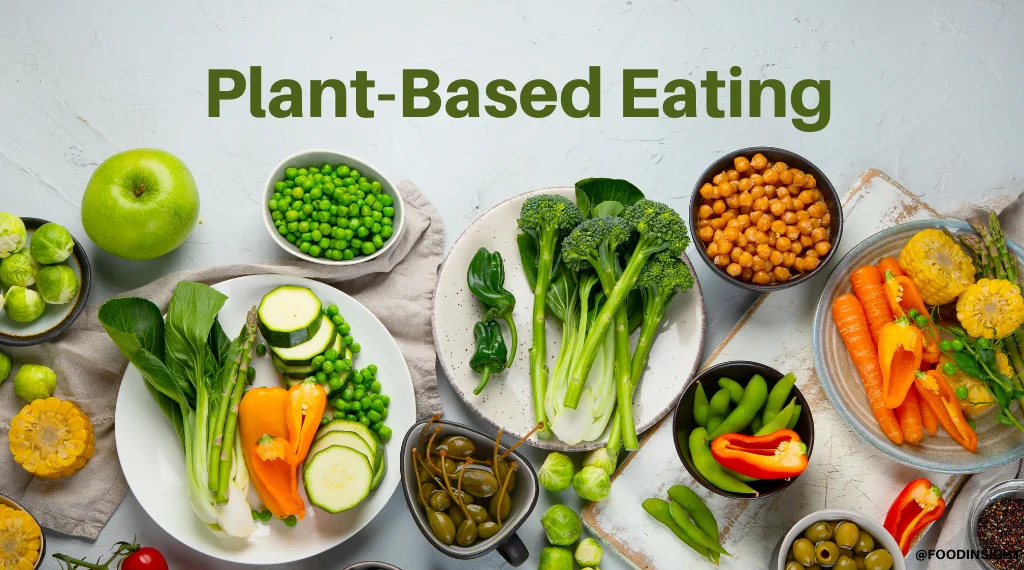Gluten Free BBQ Sauce Recipes That Even Meat-Eaters Will Love
Gluten Free BBQ Sauce Recipes That Even Meat-Eaters Will Love
Blog Article
All About Healthy And Balanced Food: Benefits of Taking On Plant Based Options
The discussion surrounding plant-based diets has actually obtained substantial focus in recent years. Many people are checking out the prospective health benefits, nutritional benefits, and environmental impacts connected with these dietary selections. As individuals become extra familiar with their food's influence on wellness and sustainability, inquiries occur concerning the usefulness of adopting such a way of life. What specific adjustments can one anticipate, and exactly how might these choices improve not just personal health and wellness yet likewise the earth's future?
Comprehending Plant-Based Diet Regimens
Although many individuals link plant-based diet regimens mainly with vegetarianism or veganism, these diet plans can encompass a wide variety of eating patterns that focus on whole, minimally processed plant foods. Such diets typically consist of fruits, vegetables, entire grains, beans, nuts, and seeds, while removing or restricting pet items. This flexibility allows people to customize their dietary options according to nutritional needs and individual preferences. Some may take on a largely plant-based diet while still periodically consuming meat or dairy, often described as a flexitarian technique. The emphasis stays on integrating more plant foods, which can cause a diverse array of flavors and dishes. Understanding these numerous analyses of plant-based consuming is important for valuing its ease of access and appeal in modern food society.
Wellness Advantages of Plant-Based Foods
The wellness advantages of plant-based foods are considerable, using a nutrient thickness advantage that supports overall wellness. Study suggests that these foods can boost heart wellness and play an essential function in reliable weight monitoring. By integrating more plant-based choices, individuals might improve their dietary selections and advertise long-lasting health and wellness.
Nutrient Thickness Benefit
Nutrient density plays a vital function in the wellness advantages of plant-based foods, making them a compelling option for those seeking a balanced diet plan. Plant-based foods, such as fruits, veggies, legumes, nuts, and whole grains, are usually abundant in crucial vitamins, minerals, and anti-oxidants while being lower in calories. This high nutrient thickness permits people to eat less calories while still meeting their dietary demands. In addition, these foods are packed with nutritional fiber, promoting gastrointestinal health and helping in weight management. By incorporating nutrient-dense plant-based options, consumers can enhance their general health and wellness, sustain their body immune systems, and lower the risk of chronic diseases. Eventually, the nutrient density of plant-based foods highlights their value in a health-conscious lifestyle.
Heart Health Enhancement

Weight Monitoring Assistance
In enhancement to advertising heart wellness, a plant-based diet regimen can considerably help in weight monitoring. This nutritional approach stresses whole foods such as fruits, veggies, beans, nuts, and whole grains, which are typically reduced in calories and greater in fiber contrasted to animal-based products. The high fiber content assists boost satiety, reducing overall calorie intake. Furthermore, plant-based diet plans are commonly rich in necessary nutrients while reduced in undesirable fats, making it much easier to keep a healthy weight. BBQ Sauces. Research indicates that people that adopt a plant-based lifestyle often tend to have reduced body mass indexes (BMIs) and experience even more effective weight management contrasted to those that take in meat-heavy diet regimens. Accepting plant-based alternatives is a tactical selection for reliable weight administration.
Nutritional Worth of Plant-Based Components
Plant-based active ingredients are abundant in crucial nutrients, offering a diverse array of vitamins, minerals, and antioxidants that add to total wellness. A comparison of healthy protein sources discloses that while pet items are commonly deemed remarkable, numerous plant-based alternatives supply appropriate healthy protein and other beneficial compounds. Comprehending the dietary worth of these ingredients can assist people make informed dietary options.
Essential Nutrients in Plants
Nutrient-rich components located in plants offer a varied range of necessary vitamins and minerals that contribute substantially to overall wellness. These active ingredients are rich in vitamins A, C, and K, which sustain immune function, vision, and blood clotting, respectively. On top of that, plants give essential minerals such as potassium, calcium, and magnesium, crucial for heart health, muscle function, and bone toughness. The existence of fiber in plant-based foods help food digestion and advertises a healthy gut microbiome. Antioxidants, discovered abundantly in vegetables and fruits, assistance fight oxidative stress and decrease swelling. Additionally, several plant foods are low in calories yet high in nutrients, making them an outstanding choice for those seeking to preserve a healthy weight while making sure optimal nutrient intake.
Contrasting Protein Resources
Protein sources differ substantially in their nutritional accounts, with plant-based ingredients offering special advantages. Unlike animal proteins, which commonly have hydrogenated fats and cholesterol, plant healthy proteins tend to be lower in these unhealthy parts. Legumes, nuts, seeds, and entire grains are rich in vital amino acids, fiber, vitamins, and minerals. Lentils give high healthy protein web content together with substantial iron and folate, while quinoa is a total healthy protein, providing all 9 vital amino acids. Additionally, plant-based proteins are usually gone along with by antioxidants and phytochemicals that support total health and wellness. The change to plant-based protein sources not just improves nutritional intake however also straightens with sustainable nutritional methods, minimizing environmental effect and promoting lasting health advantages.
Ecological Effect of Plant-Based Consuming
As awareness of environment adjustment expands, lots of individuals are discovering lasting dietary selections that can considerably minimize their ecological impact. Plant-based eating has actually become a considerable factor to decreasing greenhouse gas emissions, which are primarily associated with animals manufacturing. The growing of fruits, beans, veggies, and grains typically needs less resources, such as go to my site water and land, compared to pet farming. Furthermore, plant-based diet regimens can bring about reduced deforestation, as less land is required for grazing animals or growing animal feed. By changing towards plant-based choices, customers can sustain biodiversity and promote healthier ecosystems. Generally, accepting plant-based eating not only benefits personal health but likewise stands for a crucial action towards environmental sustainability and conservation efforts.
Overcoming Common Misconceptions
While several people recognize the advantages of a plant-based diet regimen, several misconceptions usually deter them from completely welcoming this lifestyle. A common idea is that plant-based diet regimens do not have enough healthy protein; however, various plant resources, such as vegetables, nuts, and tofu, offer enough protein. Furthermore, some presume that this diet regimen is their website costly, when in reality, staples like beans, rice, and seasonal veggies can be fairly budget-friendly. One more false impression is that plant-based consuming is overly limiting, whereas it actually supplies a diverse array of foods and tastes. Lastly, several worry that a plant-based diet might result in shortages, yet with appropriate planning, individuals can acquire all essential nutrients, including vitamins and minerals, while appreciating a wide range of delicious dishes.
Tips for Transitioning to a Plant-Based Way of living
Making the change to a plant-based way of living can be an enhancing experience, though it often needs some support to navigate the initial modifications. Initially, individuals are urged to begin gradually, integrating more fruits, vegetables, legumes, and entire grains into their meals while decreasing meat and dairy usage. Dish planning is essential; preparing a regular menu can aid reduce the adjustment and prevent last-minute harmful choices. Checking out cooking techniques and new recipes can likewise improve the experience and maintain excitement concerning plant-based eating. Additionally, signing up with support teams or neighborhoods can offer inspiration and share important suggestions. Staying informed concerning nourishment assurances well balanced meals, stopping deficiencies while cultivating a healthy, enjoyable plant-based way of life.

Delicious Plant-Based Dish Concepts
Checking out tasty plant-based meal concepts can motivate people to welcome a more nourishing diet regimen. One preferred alternative is a passionate quinoa salad, including cherry tomatoes, cucumber, and a vibrant lemon-tahini clothing. One more fave is a tasty lentil stew, packed with carrots, celery, and aromatic herbs, perfect for a soothing supper. For morning meal, over night oats made with almond milk, chia seeds, and topped with fresh berries supply a healthy begin to the day. Furthermore, a dynamic veggie stir-fry with tofu and a selection of vibrant veggies can be a quick yet satisfying dish. Finally, luscious avocado toast on whole-grain bread, sprinkled with spices and seeds, uses a simple yet delicious snack. These dishes display the selection and splendor of plant-based eating.

Often Asked Concerns
Can a Plant-Based Diet Plan Supply Enough Healthy Protein?
The inquiry of whether a plant-based diet plan can give sufficient healthy protein is usual. Many resources, including vegetables, nuts, seeds, and whole grains, can satisfy protein needs properly, sustaining a balanced and nourishing diet plan for individuals.
Are Plant-Based Diet Regimens Ideal for Kid?
The suitability of plant-based diet regimens for youngsters relies on cautious preparation. Adequate nutrients need to be ensured, consisting of proteins, vitamins, and minerals. With appropriate assistance, such diets can support healthy and balanced growth and growth in children.
Exactly how Do I Dine Out on a Plant-Based Diet plan?
Eating out on a plant-based diet plan click to read more entails seeking dining establishments with diverse menus, requesting alterations, and checking out vegan-friendly options. Planning ahead and interacting dietary preferences can enhance the dining experience while preserving nutritional options.
What Are Common Irritants in Plant-Based Foods?
Common allergens in plant-based foods consist of soy, gluten, nuts, and seeds - Sugar Free Sauces. Individuals complying with a plant-based diet regimen needs to recognize these irritants and read labels very carefully to avoid unfavorable responses and assure risk-free intake
Can Plant-Based Diets Aid With Weight-loss?
Research indicates that embracing a plant-based diet may facilitate weight management as a result of its generally reduced calorie density and greater fiber material. This mix can improve satiation, aiding individuals handle their caloric intake successfully. Many people associate plant-based diet plans primarily with vegetarianism or veganism, these diets can encompass a large variety of consuming patterns that focus on entire, minimally refined plant foods. Nutrient thickness plays a vital function in the health and wellness benefits of plant-based foods, making them an engaging selection for those seeking a balanced diet regimen. Plant-based diet regimens have been revealed to noticeably enhance heart wellness, as they often contain elements that support cardiovascular function. In addition to advertising heart health, a plant-based diet regimen can substantially help in weight monitoring. An usual belief is that plant-based diet plans do not have enough protein; nevertheless, numerous plant resources, such as beans, nuts, and tofu, supply ample protein.
Report this page